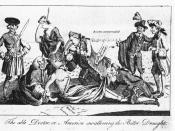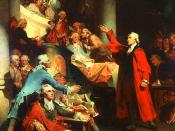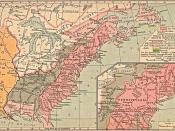The British and American ways of viewing things grew apart in the time before the American Revolution. Because America was separated from Britain, and because the Americans were not governed strictly by Britain for many years, their interpretations of many words were very different. This difference became apparent in the years right before the Revolution as Britain tried to tighten their control over the colonies. The most important differences in interpretations were those for the words "representation,"ÃÂ "sovereignty,"ÃÂ "constitution,"ÃÂ and "liberty."ÃÂ The meaning of the word "representation"ÃÂ was vastly different for the Americans than for the British. The British believed in a policy of "virtual"ÃÂ representation. This meant that those elected into Parliament represented the interests of the entire Empire. Therefore, since everyone in Parliament represented all parts of the Empire, different parts of the Empire did not have to have their own seats in Parliament. Furthermore, most English subjects did not have any more say in government than the colonies since some parts of England did not have as many people in Parliament as other parts.
The colonialists did not embrace this form of "virtual"ÃÂ representation. They took a more practical view point. They contended that they should have a certain number of seats in Parliament open for the colonies to elect representatives. They thought that people should have a say in the governing body that controls them. This view, held by Americans, came from the beginning of the colonies, where members of the colonial assembly had represented the people from the area that they were from, and had won their office. This difference in opinion was made apparent when Britain imposed taxes on the Americans. The Americans did not think that they should pay taxes if they had no say in the government that taxed them. The slogan, "No taxation without representation,"ÃÂ is an example of this view point. Because they did not think that these taxes were fair, the colonialists protested in many various ways. These protests lead to punitive laws like the Intolerable Acts, which led to more protests in a cycle which ultimately resulted in the Revolutionary War.
Another major difference in the British and American meanings of the same word is that of the word "constitutional."ÃÂ The American view of the constitution was a document that spelled out the powers of the government. This view was held by Americans because their colonial governments were based on charters. The Americans thought that if a law was unconstitutional, it held no force, and need not be obeyed. An early example of this view occurred in 1761. James Otis argued that the writs of assistance (search warrants) were unconstitutional, and therefore void. Another example was the response to the Stamp Act. The colonialists ignored the law because they thought it was unfair or unconstitutional for the colonies to pay taxes when they had no say in the government. As far as Great Britain was concerned, the constitution was the laws and institutions followed by the nation that had developed and changed over time. England would not contend that a law passed by Britain did not exist because it was unconstitutional. They might rebel against the government that passed the law, but they would not contest the legitimacy of it. The colonists ignoring laws they deemed unconstitutional angered the British government, which lead to actions that caused the war. Like the difference of interpretation of the word "representation,"ÃÂ the difference of interpretation of the word "constitution"ÃÂ was a cause of the American Revolution.
There was another difference in opinion over the meaning of "sovereignty."ÃÂ English people did not view "sovereignty"ÃÂ as something that could be divided. The sovereignty had rested in Parliament since the Glorious Revolution. English did not think that the power of a nation could be in different places. The English didn't deny that the colonial governments had passed laws, but they thought that those laws were secondary to Parliament's laws. The colonists did not hold this opinion. Their colonial government had shouldered much of the government power and responsibility since the colonies were founded. The colonialists did not think of Parliament as having all power. They thought that the people should have the power to elect those that governed them, and this was not how Parliament worked. Eventually, the colonists rejected Parliament's right to tax them by protesting the Stamp Act, the Sugar Act, and the Townshend Act. An example of this view was when Patrick Henry claimed that only the House of Burgesses had the right to tax Virginians. The British view that Parliament was sovereign was made apparent in America with the Declaratory Act where Parliament claimed to have the power to enact any law on the colonies. The difference in opinion on this matter was a major cause of the revolution because the colonists refusal to accept Parliament as sovereign was the reason that they fought the taxes and other acts that the colonial governments didn't pass.
The last word that the British and Americans had varied interpretations of was "liberty."ÃÂ The British had a vague view of liberty. They did not have certain liberties spelled out. The colonialist had become used to having freedoms because Great Britain did not exert much control over them. When Britain started to change its polices in 1763, the liberties that the colonists had enjoyed were in some cases, taken away. This was evident in the colonists protests to the Sugar Act which took away their rights to trial by jury, and the protests to the taxes, because they thought they should have the liberty to only pay taxes to governments to which they had representation. The colonialists also protested the Quartering Act because it was thought to be a violation of rights to force people to feed and lodge soldiers. The different ideas of what liberty meant lead to Britain passing laws that restricted their liberty. These laws lead to the war.
The variation in the British and American views on certain concepts had changed over years of separation. These divergences were made apparent when Britain decided that they had to tighten their control on the colonies. Their views on "liberty,"ÃÂ "sovereignty,"ÃÂ "representation,"ÃÂ and "constitution"ÃÂ had become very different; so different, they helped lead to the revolution.





